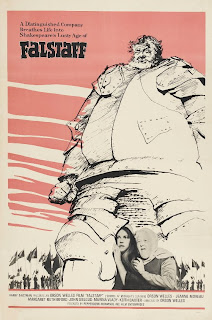Despite the abundance of no money, the technical limitations of his crew, and the fact that he basically stole the resources to make the movie when he was really supposed to be acting in an adaptation of Treasure Island for another director, Welles managed to make a profound and beautiful movie that I regard as the greatest Shakespeare adaption I have ever seen. Welles was 49 when he made the movie, though with his makeup and padding he looks much older, and it is the most mature and complete movie he ever finished. It was the last feature-length fictional film he ever made as well as his last movie in black & white.

Part of the reason for the huge artistic success of Chimes at Midnight is that it was a project Welles had been working on for over twenty-five years. It started as a stage production in 1939, when he was 23 years old and two years before Citizen Kane. That production, which attempted to adapt Shakespeare's full history cycle as one mammoth production, was his first spectacular failure. Welles previously had been very successful with two landmark Shakespearian productions, a version of MacBeth set in Haiti with an all-black cast and a version of Julius Caesar set in facist Italy, but his tendency to try and outdo himself with each successive project finally got the better of him with this one. Eventually by 1960 he had pared the material down to focus on John Falstaff, usually portrayed as a clown but reinterpreted by Welles as a noble and ultimately tragic ruffian who he described as "the most completely good man in all of drama." It's a curious statement about a character who is a drunkard, a wastrel and a thief, but Welles is very sincere in his affection for Sir John.
The interview with Welles linked to above is one of his best, and his description of the themes of the play relating to death is very instructive:
I can see that there are scenes which should be much more hilarious, but I directed everything and played everything with a view to preparing for the last scene, so the relationship between Falstaff and the Prince is no longer the simple comic one that it is in Shakespeare’s Henry IV, Part One, but always a preparation for the end. And as you see, the farewell is performed about four times during the movie, as a preparation for the tragic ending: The death of Hotspur, which is that of Chivalry, the death of the King in his castle, the death of the Prince (who becomes King) and the poverty and illness of Falstaff. These are presented throughout the film and must darken it. I do not believe that comedy should dominate in such a film.
Chimes at Midnight is a very difficult movie for me to write about. It's my favourite movie by my favourite director, and it's also my favourite Shakespeare adaptation. I feel like my knowledge of Orson Welles's filmography and other work is more than sound, but my knowledge of Shakespeare's history plays and their sources is much more shaky.
My blog posts on Chimes at Midnight, therefore, will serve to help me sort out my feelings for the movie and for the character, and maybe they will help to nail down exactly why I feel such a strong affinity for Welles's work.







Excellent -- and when has lack of expertise kept anyone from commenting on the intarwub? The best adaptations take their source texts and adapt them to the different medium. Plays are much easier to adapt in that sense, but there's still so much to decide. A play is not a movie. People can get pedantically focused on the "faithfulness" of an adaptation.
ReplyDeleteWhen I think of Shakespeare I tend to think of productions I've seen, not films. The films I like tend to be ones where the creators' vision has the confidence to stand toe-to-toe with the bard: Kaurismäki's Hamlet Goes Business (my fave), Taymor's Titus, Polanski's Macbeth. One of the recent BBC "Retold" Shakespeares -- Macbeth with James McAvoy, Keeley Hawes and Richard Armitage -- set the story in a swanky restaurant as a battle between chefs.
Chimes is indeed terrific. The battle scene alone: how many directors would not sell their souls to have accomplished that?
I totally agree about adaptations. For example, I think that Clueless was a better adaptation of Jane Austen's Emma than the 1996 movie Emma with Gwyneth Paltrow.
ReplyDelete